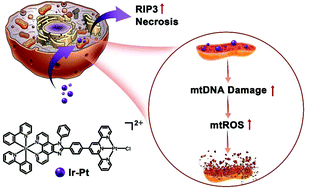Mitochondrial DNA targeting and impairment by a dinuclear Ir–Pt complex that overcomes cisplatin resistance†
Abstract
Mounting evidence suggests that impairment of mitochondrial DNA (mtDNA), an important element in the response of mitochondrial biological function but more susceptible to damage than nuclear DNA (nDNA), can activate the progress of cell death. Herein, an iridium(III) moiety was introduced to a terpyridyl platinum(II) derivative, and the designed compound, Ir–Pt, has achieved mitochondrial accumulation by a rate of up to 76% as determined by ICP-MS. The anticancer activity and mechanism of action have been investigated. The MTT assay indicated that Ir–Pt exhibited strong antitumor activity towards cisplatin-resistant cancer cells (A549R). Additionally, the designed complex severely damaged mtDNA, sequentially disrupted the mitochondrial function, and resulted in a loss of mitochondrial membrane potential (MMP) and depletion of ATP. Furthermore, cell death occurred as a consequence of necrosis induced by Ir–Pt, characterized by the release of LDH, over-expression of the RIP3 protein and lack of activation of the typical apoptotic signal in caspase 3/7. All of these results suggested that the mtDNA-targeting Ir–Pt is a potential antitumor agent that overcomes cisplatin-resistance in cancer cells.



 Please wait while we load your content...
Please wait while we load your content...